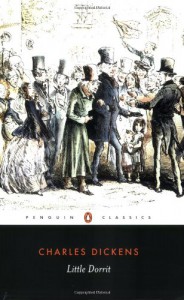Little Dorrit
 Little Dorrit is one of the less reviewed Dickens, it is clearly not “up there” with [b:Great Expectations|2623|Great Expectations|Charles Dickens|https://d.gr-assets.com/books/1327920219s/2623.jpg|2612809], [b:A Tale of Two Cities|1953|A Tale of Two Cities|Charles Dickens|https://d.gr-assets.com/books/1344922523s/1953.jpg|2956372], [b:Oliver Twist|18254|Oliver Twist|Charles Dickens|https://d.gr-assets.com/books/1327868529s/18254.jpg|3057979] and whatnot. I wish I could advance a theory as to why but I can’t because Little Dorrit really does deserve to be mentioned in the same breath as those acclaimed titles. Any way, it’s been years since I read a Dickens and it is always nice to pick one up. I just get a kick out of his writing style, the way the prose occasionally switch into a poetic / rhythmic mode, the way every character seems to have their own distinctive speech pattern and catch phrases, and the characters and story of course.
Little Dorrit is one of the less reviewed Dickens, it is clearly not “up there” with [b:Great Expectations|2623|Great Expectations|Charles Dickens|https://d.gr-assets.com/books/1327920219s/2623.jpg|2612809], [b:A Tale of Two Cities|1953|A Tale of Two Cities|Charles Dickens|https://d.gr-assets.com/books/1344922523s/1953.jpg|2956372], [b:Oliver Twist|18254|Oliver Twist|Charles Dickens|https://d.gr-assets.com/books/1327868529s/18254.jpg|3057979] and whatnot. I wish I could advance a theory as to why but I can’t because Little Dorrit really does deserve to be mentioned in the same breath as those acclaimed titles. Any way, it’s been years since I read a Dickens and it is always nice to pick one up. I just get a kick out of his writing style, the way the prose occasionally switch into a poetic / rhythmic mode, the way every character seems to have their own distinctive speech pattern and catch phrases, and the characters and story of course.I am fairly useless at deciphering themes from novels but if there is a single overriding theme in Little Dorrit that communicates itself to me I would say it is the virtue of modesty. The eponymous Little Dorrit (real name Amy Dorrit) is a young lady of twenty+, small in stature, unassuming in manner, without an atom of malice, kindly and virtuous to a fault. She is one of Dickens’ angelic girl stock characters. Yet the novel also shows that always being self-sacrificing, never thinking or doing anything for oneself can lead to a lot of unhappiness and being taken for granted by the people we are servicing. (TV Tropes.com classify this character type as “Incorruptible Pure Pureness”!). Sometime I am a little resentful that Dickens expects me to love this shrinking violet of a character but her niceness does club me into submission after a while. If only real people could be like this.
Besides being a character study Dickens also has a lot to say about the bureaucracy, the class system of the time, debtors prisons and whatnot. I don’t want to go into details about such weighty matters but a special note should be made for the Circumlocution Office, a fictional government office which is a great bit of lampooning about red tapes.“This is the way in which she is doomed to be a constant slave to them that are not worthy that a constant slave she unto them should be.”
Dickens’ prose is great to read as always, sometime beautiful, sometime sarcastic, and sometime hilarious. The dialogue similarly range from silly to heartfelt and profound, it brought a lump to this throat a few times. A very rare thing while reading I assure you. I am more sedimental than sentimental.
In rating the book so high I am really cutting Dickens a lot of slack. His usage of deus ex machina at several plot points is a little outrageous. People become rich and poor at the drop of a hat, buildings fall on people just because they deserve it. Still, the way I see it a five stars rating does not indicate that the book is perfect; it just means that I like it a lot and am willing to forgive its flaws.
If you were made to read Dickens at school and have consequently been avoiding him like the plague to this day as an adult reader I would suggest you give him another try. Personally I am always up for a bit of Dickens, my favorite Victorian author probably.
________________________
Note: This review is based on the audiobook version amazingly well read by Mil Nicholson (with voices and accents galore), available for free at Librivox.



